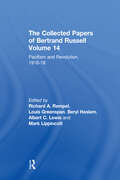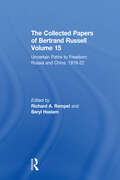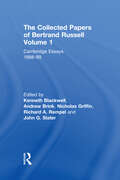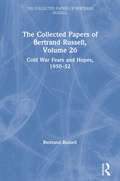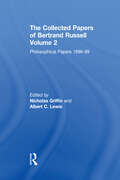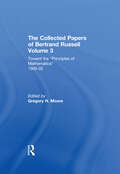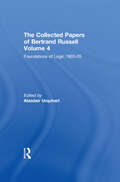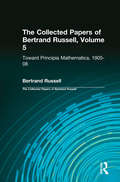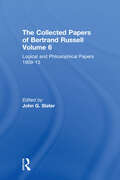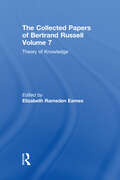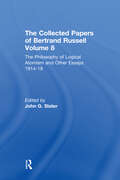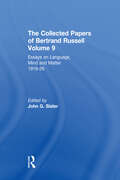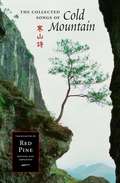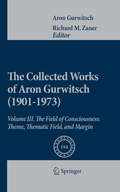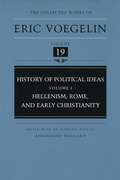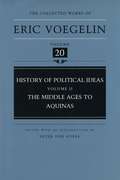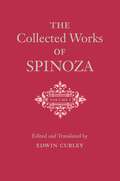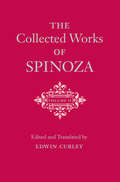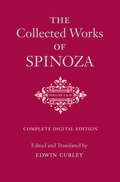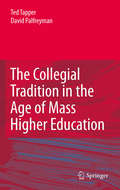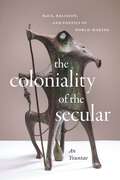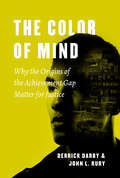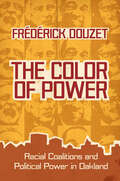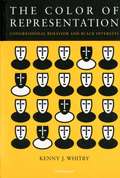- Table View
- List View
The Collected Papers of Bertrand Russell, Volume 14: Pacifism and Revolution, 1916-18 (The Collected Papers of Bertrand Russell)
by Bertrand RussellDuring the First World War, Bertrand Russell was political commentator for The Tribunal, the official weekly publication of the No-Conscription Fellowship, of which Russell was Action Chairman.This volume contains many short papers from that period, which reflect Russell's immediate reponses to developments in the conflict. These documents bear witness to Russell's growing commitment to pacifism, and reveal the development of the patterns of political argument, rhetoric and activism which were to characterise his work throughout his life.
The Collected Papers of Bertrand Russell, Volume 15: Uncertain Paths to Freedom: Russia and China 1919-1922 (The Collected Papers of Bertrand Russell)
by Bertrand Russell Richard A. Rempel Andrew Bone Albert C. Lewis Beryl HaslamThe Collected Papers of Bertrand Russell, Volume 15 assembles Russell's writings on his experiences of visiting and reflecting on Russia and China.Having emerged from the Great War determined to prevent another armed conflict, Russell became a champion of international socialism as the antidote to the destructive forces of nationalism and capitalism. His quest for international reconstruction led to two enduring experiences, his trip first to Bolshevik Russia in 1920 and then to divided China in 1920-21. These letters describe those experiences which confirmed his emergence as a popular commentator on contemporary political issues.The volume includes two unpublished papers on Russell's trip to Russia.
The Collected Papers of Bertrand Russell, Volume 1: Cambridge Essays 1888-99 (The Collected Papers of Bertrand Russell #1)
by Nicholas Griffin Richard A. Rempel Andrew Brink Kenneth Blackwell John G. SlaterCovering the topics of God, immortality, conscience and immortality, this volume presents a selection of essays of the first decade of Russell as an independent thinker. It includes his graduate essays, adolescent writings and ideas on ethics, Bacon, Hobbes and DesCartes, psychology and politics.
The Collected Papers of Bertrand Russell, Volume 26: Cold War Fears and Hopes, 1950–52 (The Collected Papers of Bertrand Russell)
by Bertrand RussellThe Collected Papers of Bertrand Russell, Volume 26 covers a period of transition in Russell's political life between his orthodox and sometimes pugnacious defence of the West in the early post-war, and the dissenting advocacy of nuclear disarmament and détente that started in earnest in the mid-1950s. While some of the assembled writings echo harsh prior criticism of Soviet expansionism and dictatorship, others register growing qualms about the recklessness of American foreign policy and the baneful effects on civil liberties of anti-communist hysteria inside the United States. Whether continuing to push for western rearmament, or highlighting in a more placatory vein the folly of the Cold War's divisions and rival fanaticisms, Russell's paramount objective was avoiding a war that threatened global catastrophe. Suspended between fear and hope, he expounded his evolving political concerns–and much else besides, including autobiographical reflections and typically common-sense guidance for living well–in a constant flow of newspaper and magazine articles, letters to editors, radio broadcasts and discussions and, of special note, a Nobel Prize acceptance speech. Russell also completed two lecture tours of the United States (the last of many), as well as a landmark such visit to Australia. All three of these journeys, and the textual record they left, are examined in depth using manuscript material and unpublished correspondence from the Bertrand Russell Archives at McMaster University, which is mined extensively throughout the volume.
The Collected Papers of Bertrand Russell, Volume 2: The Philosophical Papers 1896-99 (The Collected Papers of Bertrand Russell)
by Nicholas Griffin Albert C. Lewis William G. StrattonThe 1896-1899 papers, few of which were published in Russell's lifetime, concentrate primarily on physics, arithmetic and the concept of quantity. Several views that later became well-known in his The Principles of Mathematics actually originate in his earlier work, and though incomplete,An Analysis of Mathematical Reasoning, forms a centrepiece of the volume.
The Collected Papers of Bertrand Russell, Volume 3: Toward the 'Principles of Mathematics' 1900-02 (The Collected Papers of Bertrand Russell)
by Gregory H. MooreThis volume shows Russell in transition from a neo-Kantian and neo-Hegelian philosopher to an analytic philosopher of the first rank. During this period his research centred on writing The Principles of Mathematics where he drew together previously unpublished drafts. These shed light on Russell's paradox. This material will alter previous accounts of how he discovered his paradox and the related paradox of the largest cardinal. The volume also includes a previously unpublished draft of an early attempt to solve his paradox, as well as the earliest known version of his generalised relation arithmetic. It contains three articles which have never previously been published in English.
The Collected Papers of Bertrand Russell, Volume 4: Foundations of Logic, 1903-05 (The Collected Papers of Bertrand Russell)
by Bertrand RussellThis volume covers the period from the beginning of Whitehead and Russell's work on Volume 2 of the Principles of Mathematics to the critical discovery of the theory of descriptions in 1905. The volume contains a large number of unpublished manuscripts which give a vivd picture of Russell wrestling with the logical paradoxes, often unsuccessfully, as he tries out one foundational scheme after another. Previously unpublished work in the theory of denoting is included, which predates the famous article of 1905. This volume also gathers together several manuscripts on the so-called 'zig-zag' theory with which Russell attempted to provide a type-free foundation for mathematics. A number of reviews and survey articles, together with two talks on modality and truth, are also published for the first time.
The Collected Papers of Bertrand Russell, Volume 5: Toward Principia Mathematica, 1905–08 (The Collected Papers of Bertrand Russell #5)
by Bertrand RussellThis volume of Bertrand Russell's Collected Papers finds Russell focused on writing Principia Mathematica during 1905–08. Eight previously unpublished papers shed light on his different versions of a substitutional theory of logic, with its elimination of classes and relations, during 1905-06. A recurring issue for him was whether a type hierarchy had to be part of a substitutional theory. In mid-1907 he began writing up the final version of Principia, now using a ramified theory of types, and eleven unpublished drafts from 1907-08 deal with this. Numerous letters show his thoughts on the process. The volume's 80-page introduction covers the evolution of his logic from 1896 until 1909, when volume I of Principia went to the printer.
The Collected Papers of Bertrand Russell, Volume 6: Logical and Philosophical Papers 1909-13 (The Collected Papers of Bertrand Russell)
by Bertrand Russell Bernd Frohmann John G. SlaterThe years covered by this volume of the Collected Papers of Bertrand Russell were among the most productive, philosophically speaking, of Russell's entire career. In addition to the papers reprinted here, he bought Principia Mathematica to its finished form and wrote The Problems of Philosophy, Theory of Knowledge and Knowledge of the External World. In October 1910 he began teaching at Cambridge, having accepted an appointment as lecturer in logic and the principles of mathematics at Trinity College for a term of five years. A year later Ludwig Wittgenstein began to attend his lectures. Within a few months he was influencing Russell's philosophical thinking as much as, or more than, Russell was influencing his.
The Collected Papers of Bertrand Russell, Volume 7: Theory of Knowledge: The 1913 Manuscript (The Collected Papers of Bertrand Russell)
by Bertrand Russell Kenneth Blackwell Elizabeth Ramsden EamesThis volume provides a historical introduction in the writing of the manuscript. Theory of Knowledge: The 1913 Manuscript is the only book-length work on epistemology that Russell left unpublished in its original form, and its publication here is an important addition to knowledge of Russell's thought.
The Collected Papers of Bertrand Russell, Volume 8: The Philosophy of Logical Atomism and Other Essays 1914-19 (The Collected Papers of Bertrand Russell)
by Bertrand Russell John G. SlaterThis volume collects together all of Russell's philosophical papers inspired by his work with Whitehead on 'Principia Mathematica'.
The Collected Papers of Bertrand Russell, Volume 9: Essays on Language, Mind and Matter, 1919-26 (The Collected Papers of Bertrand Russell)
by Bernd Frohmann John G. SlaterThis volume contains Russell's reviews of and introductions to other philosophical works including his famous introduction to Wittgenstein's Tractatus Logico-Philosophicus.
The Collected Philosophical Papers of G.E.M. Anscombe: Ethics, Religion And Politics
by G. E. AnscombeAn essential collection of Anscombe's work on ethics and intention <p> Gertrude Elizabeth Margaret Anscombe is considered one of analytical philosophy's most prominent figures and a leader in the field of virtue ethics. Ethics, Religion, and Politics: Collected Philosophical Papers, Volume 3, is part of a multi-volume compilation of her work surrounding the philosophy of mind, philosophy of action, philosophy of language, philosophical logic, and ethics. This volume includes selected works relating to consequentialism, intention, and more, providing Ascombe scholars with a high-level view of her evolution of thought.
The Collected Songs of Cold Mountain
by Cold MountainThis authoritative, bilingual edition represents the first time the entirety of Cold Mountain's poetry has been translated into English.These translations were originally published by Copper Canyon Press nearly twenty years ago. Now, significantly revised and expanded, the collection also includes a new preface by the translator, Red Pine, whose accompanying notes are at once scholarly, accessible, and entertaining. Also included for the first time are poems by two of Cold Mountain's colleagues.Legendary for his clarity, directness, and lack of pretension, the eight-century hermit-poet Cold Mountain (Han Shan) is a major figure in the history of Chinese literature and has been a profound influence on writers and readers worldwide. Writers such as Charles Frazier and Gary Snyder studied his poetry, and Jack Kerouac's Dharma Bums is dedicated "to Han Shan." 1.Bstoried cliffs were the fortune I castbird trails beyond human trackswhat surrounds my yardwhite clouds nesting dark rocksI've lived here quite a few yearsand always seen the spring-water changetell those people with tripods and bellsempty names are no damn good 71.someone sits in a mountain gorgecloud robe sunset tasselshandful of fragrances he'd sharethe road is long and hardregretful and doubtfulold and unaccomplishedthe crowd calls him crippledhe stands alone steadfast 205.my place is on Cold Mountainperched on a cliff beyond the circuit of afflictionimages leave no trace when they vanishI roam the whole galaxy from herelights and shadows flash across my mindnot one dharma comes before mesince I found the magic pearlI can go anywhere everywhere it's perfect Cold MountainA mountain man lives under thatchbefore his gate carts and horses are rarethe forest is quiet but partial to birdsthe streams are wide and home to fishwith his son he picks wild fruitwith his wife he hoes between rockswhat does he have at homea shelf full of nothing but books
The Collected Works of Aron Gurwitsch (1901-1973)
by Richard M. Zaner Aron GurwitschThis volume of the Collected Works edition contains Gurwitsch's magnum opus, which emphasizes how items in the thematic field are relevant to the theme. It is introduced by his student Richard Zaner. This volume also includes the posthumous text, "Marginal Consciousness," the contents of which were merely summarized in The Field of Consciousness. It presents his positions on the body and on ego-less consciousness in detail. Gurwitsch's student, Lester Embree, introduces it. For the full appreciation of their significance, all earlier and later writings by Gurwitsch must be related to the contents of this volume.
The Collected Works of Eric Voegelin Volume 19: Hellenism, Rome, and Early Christianity
by Eric Voegelin Athanasios MoulakisIn Hellenism, Rome, and Early Christianity, Voegelin demonstrates that the "spiritual disintegration" of the Hellenic world inaugurated a long process of transition in the self- understanding of Mediterranean and European man. The reflections that emerge remain universal concerns regarding the order of human existence in society and history. Although one may come to different conclusions, Voegelin's responses to the problems of the period suggest avenues of investigation that are still little traveled.
The Collected Works of Eric Voegelin Volume 20: The Middle Ages to Aquinas
by Peter Von Sivers Eric VoegelinHistory of Political Ideas contains both analyses of themes Voegelin developed in his later works and discussions of authors and ideas to which he did not return or which he later approached from a different angle and with a different emphasis. The Middle Ages to Aquinas has withstood the test of time. What makes it still highly valuable is its thoroughly revisionist approach, cutting through all the convenient cliches and generalizations and seeking to establish the experiential underpinnings that typified the medieval period.
The Collected Works of Spinoza, Volume I: One-volume Digital Edition
by Benedictus de SpinozaThe Collected Works of Spinoza provides, for the first time in English, a truly satisfactory edition of all of Spinoza's writings, with accurate and readable translations, based on the best critical editions of the original-language texts, done by a scholar who has published extensively on the philosopher's work.This first volume contains Spinoza's single most important work, the Ethics, and four earlier works: the Treatise on the Emendation of the Intellect, the Short Treatise on God, Man, and His Well-Being, Descartes' "Principles of Philosophy," and Metaphysical Thoughts. Also included are Spinoza's letters from the periods when these works were being written.The elaborate editorial apparatus—including prefaces, notes, glossary, and indexes—assists the reader in understanding one of the world's most fascinating, but also most difficult, philosophers. Of particular interest is the glossary-index, which provides extensive commentary on Spinoza's technical vocabulary.A milestone of scholarship more than forty-five years in the making, The Collected Works of Spinoza is an essential edition for anyone with a serious interest in Spinoza or the history of philosophy.
The Collected Works of Spinoza, Volume II: One-volume Digital Edition
by Benedictus de SpinozaThe second and final volume of the most authoritative English-language edition of Spinoza's writingsThe Collected Works of Spinoza provides, for the first time in English, a truly satisfactory edition of all of Spinoza's writings, with accurate and readable translations, based on the best critical editions of the original-language texts, done by a scholar who has published extensively on the philosopher's work.The centerpiece of this second volume is Spinoza’s Theological-Political Treatise, a landmark work in the history of biblical scholarship, the first argument for democracy by a major philosopher, and a forceful defense of freedom of thought and expression. This work is accompanied by Spinoza’s later correspondence, much of which responds to criticism of the Theological-Political Treatise. The volume also includes his last work, the unfinished Political Treatise, which builds on the foundations of the Theological-Political Treatise to offer plans for the organization of nontyrannical monarchies and aristocracies.The elaborate editorial apparatus—including prefaces, notes, glossary, and indexes—assists the reader in understanding one of the world’s most fascinating, but also most difficult, philosophers. Of particular interest is the glossary-index, which provides extensive commentary on Spinoza’s technical vocabulary.A milestone of scholarship more than forty-five years in the making, The Collected Works of Spinoza is an essential edition for anyone with a serious interest in Spinoza or the history of philosophy.
The Collected Works of Spinoza, Volumes I and II: One-Volume Digital Edition
by Benedictus de SpinozaThe Collected Works of Spinoza: Complete Digital Edition, combining volumes I and II, provides for the first time in English, a truly satisfactory edition of all of Spinoza's writings, with accurate and readable translations, based on the best critical editions of the original-language texts, done by a scholar who has published extensively on the philosopher’s work.The first volume contains Spinoza’s single most important work, the Ethics, and four earlier works: the Treatise on the Emendation of the Intellect, the Short Treatise on God, Man, and His Well-Being, Descartes’ "Principles of Philosophy," and Metaphysical Thoughts. Also included are Spinoza’s letters from the periods when these works were being written.The centerpiece of the second volume is Spinoza’s Theological-Political Treatise, a landmark work in the history of biblical scholarship, the first argument for democracy by a major philosopher, and a forceful defense of freedom of thought and expression. This work is accompanied by Spinoza’s later correspondence, much of which responds to criticism of the Theological-Political Treatise. The volume also includes his last work, the unfinished Political Treatise, which builds on the foundations of the Theological-Political Treatise to offer plans for the organization of nontyrannical monarchies and aristocracies.The elaborate editorial apparatus—including prefaces, notes, glossary, and indexes—assists the reader in understanding one of the world’s most fascinating, but also most difficult, philosophers. Of particular interest is the glossary-index, which provides extensive commentary on Spinoza’s technical vocabulary.A milestone of scholarship more than forty-five years in the making, The Collected Works of Spinoza is an essential edition for anyone with a serious interest in Spinoza or the history of philosophy.
The Collegial Tradition in the Age of Mass Higher Education
by David Palfreyman Ted TapperThis book will examine the relationship between collegiality and the collegial tradition in the context of the development of mass higher education. The collegial tradition in higher education has been shaped above all by the collegiate universities. In all its various forms (as commensality, as a mode of governance, and as a critical force in shaping the process of teaching, learning and research) the collegial tradition has found sustenance in many sectors of higher education. It may well be that the tradition as expressed in these forms now has more strength and depth in the non-collegiate than in the collegiate universities. This work will give a fuller picture of the present-day character of British (especially English) higher education. Although this is a book that will rely particularly upon the Oxford experience of collegiality, there will be extensive comparative and international reference to the idea of collegiality, the various challenges to it that have emerged within different national systems, and the contrasting patterns of adjustment to those challenges.
The Coloniality of the Secular: Race, Religion, and Poetics of World-Making
by Yountae AnIn The Coloniality of the Secular, An Yountae investigates the collusive ties between the modern concepts of the secular, religion, race, and coloniality in the Americas. Drawing on the work of Édouard Glissant, Frantz Fanon, Aimé Césaire, Sylvia Wynter, and Enrique Dussel, An maps the intersections of revolutionary non-Western thought with religious ideas to show how decoloniality redefines the sacred as an integral part of its liberation vision. He examines these thinkers’ rejection of colonial religions and interrogates the narrow conception of religion that confines it within colonial power structures. An explores decoloniality’s conception of the sacred in relation to revolutionary violence, gender, creolization, and racial phenomenology, demonstrating its potential for reshaping religious paradigms. Pointing out that the secular has been pivotal to regulating racial hierarchies under colonialism, he advocates for a broader understanding of religion that captures the fundamental ideas that drive decolonial thinking. By examining how decolonial theory incorporates the sacred into its vision of liberation, An invites readers to rethink the transformative power of decoloniality and religion to build a hopeful future.
The Color of Mind: Why the Origins of the Achievement Gap Matter for Justice (History and Philosophy of Education Series)
by Derrick Darby John L. Rury“An indispensable text for understanding educational racial injustice and contributing to initiatives to mitigate it.” —Educational TheoryAmerican students vary in educational achievement, but white students in general typically have better test scores and grades than black students. Why is this the case, and what can school leaders do about it? In The Color of Mind, Derrick Darby and John L. Rury answer these pressing questions and show that we cannot make further progress in closing the achievement gap until we understand its racist origins.Telling the story of what they call the Color of Mind—the idea that there are racial differences in intelligence, character, and behavior—they show how philosophers, such as David Hume and Immanuel Kant, and American statesman Thomas Jefferson, contributed to the construction of this pernicious idea, how it influenced the nature of schooling and student achievement, and how voices of dissent such as Frederick Douglass, Frances Ellen Watkins Harper, and W.E.B. Du Bois debunked the Color of Mind and worked to undo its adverse impacts.Rejecting the view that racial differences in educational achievement are a product of innate or cultural differences, Darby and Rury uncover the historical interplay between ideas about race and American schooling, to show clearly that the racial achievement gap has been socially and institutionally constructed. School leaders striving to bring justice and dignity to American schools today must work to root out the systemic manifestations of these ideas within schools, while still doing what they can to mitigate the negative effects of poverty, segregation, inequality, and other external factors that adversely affect student achievement. While we can’t expect schools alone to solve these vexing social problems, we must demand that they address the injustices associated with how we track, discipline, and deal with special education that reinforce long-standing racist ideas. That is the only way to expel the Color of Mind from schools, close the racial achievement gap, and afford all children the dignity they deserve.
The Color of Power: Racial Coalitions and Political Power in Oakland (Race, Ethnicity, and Politics)
by Frédérick DouzetThe Color of Power is a fascinating examination of the changing politics of race in Oakland, California. Oakland has been at the forefront of California’s multicultural changes for decades. Since the 1960s, the city has been a shining example of a fruitful liberal black-and-white political partnership and the successful incorporation of black politicians into the political landscape. But over the past forty years, the balance of power has changed as a consequence of dramatic demographic trends and economic circumstances. The city’s formerly dominant biracial political machine has been challenged by the demands of new multiracial interests.The city, once governed by a succession of black mayors and majority black city councils, must now accommodate rapidly growing Asian and Latino communities. While the black-led coalition still relies on white progressive support, this alliance has weakened due to a shift in the progressives’ agenda and the voting habits of the black community, the rise of a Hispanic-Asian coalition, and a strong demographic decline of the African American population. With similar demographic changes taking place across the nation, Oakland’s experience provides insight in to the multiracial future of other American cities.The Color of Power investigates Oakland’s contemporary racial politics with a detailed study of conflicts over issues like education, elections and political representation, and crime. Trained as a journalist, a political scientist, and a geographer, the author provides a unique perspective supported by numerous maps and extensive interviews.Winner of awards from the French Society of Geography and the French National Academy of Sciences
The Color of Representation
by Kenny J. WhitbyThe central domestic issue in the United States over the long history of this nation has been the place of the people of color in American society. One aspect of this debate is how African-Americans are represented in Congress. Kenny J. Whitby examines congressional responsiveness to black interests by focusing on the representational link between African-American constituents and the policymaking behavior of members of the United States House of Representatives. The book uses the topics of voting rights, civil rights, and race- based redistricting to examine how members of Congress respond to the interests of black voters. Whitby's analysis weighs the relative effect of district characteristics such as partisanship, regional location, degree of urbanization and the size of the black constituency on the voting behavior of House members over time. Whitby explores how black interests are represented in formal, descriptive, symbolic, and substantive terms. He shows the political tradeoffs involved in redistricting to increase the number of African-Americans in Congress. The book is the most comprehensive analysis of black politics in the congressional context ever published. It will appeal to political scientists, sociologists, historians, and psychologists concerned with minority politics, legislative politics, and the psychological, political, and sociological effects of increasing minority membership in Congress on the perception of government held by African Americans.
